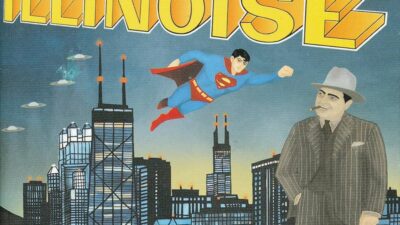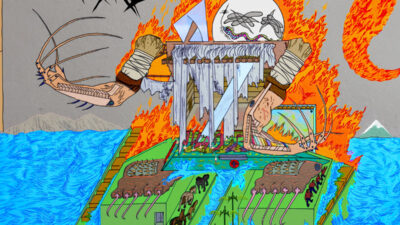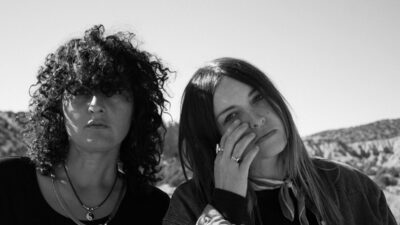In the 1980s, Washington DC was known as the epicenter of the American hardcore movement. The cheap housing and gritty environment encouraged an expressive climate similar to Brooklyn in the late 2000s or Philadelphia in 2019. In recent years, however, the DC creative class has been forced to combat rampant gentrification, skyrocketing rent, and political turmoil specifically targeting District bands through phenomena like Pizzagate—what was once a vibrant DIY community has been vigorously tested. However, a number of devoted key players are helping to keep the spirit of unincorporated music and art alive in America’s capitol. Babe City Records, run by Jon Weiss, Peter Lillis, Jules Hale, and Danielle Vu, has been a Washington, DC institution since 2014 and is a driving force behind local favorites like Den Mate, BRNDA, and The Sea Life, as well as a valuable aid for up-and-coming national acts such as Gingerlys and Varsity. I had the pleasure of talking to Babe City key player, DC talent-buying legend, and hardworking musician Jon Weiss about the label’s homegrown beginnings, what makes him love an artist, and the music that inspires him to keep doing what he loves.
Let’s back it up to the beginning. What drew you to the idea of starting a record label and is Babe City the first label you’ve been involved with?
Jon Weiss: One thing was the people I was around. The musicians that were excited about labels definitely rubbed off on me and got me into the idea, but I think ultimately what happened was my friend Bryan Gerhart was in a band called Baby Bry Bry and he started his own record label. I really wanted him to release our shit, and he put out a cassette and I was like, “Damn, this is awesome!” It just seemed easy what he was doing. It seemed so sick that you’re curating this label—a label to slap on this band. They’re part of this movement, or whatever. I kinda thought if it’s that easy… so me and a few friends were like why don’t we try this ourselves? It was awesome. It was super cool to make something out of nothing and also have all of us pouring our energy into something collectively. The fucking best part is when you’re doing right by a band and helping them succeed, them being grateful for that is this huge thing that I can’t even describe. It’s so fucking cool to feel like you’re just helping someone and that someone is a person you respect and admire because you love their music. It’s cool. Sometimes I’ll hear music now and be, like, “I really want to release this.” That’s something that I had that feeling before starting a record label and I think what drew me to it was being involved and immersed in music and the DC music scene and how receptive people were to it and how it impacted the bands and how it impacted me. I think a lot of people are drawn to starting a label, or being in a band, or working on something, but I think the thing that keeps you there is the experience you have. The experience I had was really positive. Whether or not we were making any fucking money is a different story. To this day too, it’s not my 24/7. It’s not my day job, but it’s something that I can’t picture myself living without.
How did you initially fund Babe City? I’ve looked into starting a label and it’s not a cheap endeavour and it’s not always a profitable one.
JW: There’s definitely risk involved. If you’re starting out putting out cassettes and CDs like we did and the bands are actively touring then it really isn’t that much money to start a label. I mean, you need like $250 to print 100 CDs and make a free Bandcamp page and you’re fucking set. What gets more into that is when you’re trying to pay for publicity or pay for radio ads or radio campaigns. A large part of that was we were really turned off by how much publicity cost. The first time we did a release, this band Young Rapids, we really wanted to start it off right. So we hired this fancy publicist that cost, like, $3,000 and we printed vinyl and we pretty much did everything wrong to figure out how to do it right. And then we started figuring out how to do publicity ourselves and how to work on it and do a pretty good job of getting artists on Stereogum and NPR and Brooklyn Vegan and other great publications. I think basically we just figured out how to do things in-house so we didn’t have to pay these large sums of money to make our artists happy.
In terms of funding we would just save up. We aren’t making much now, but when we were right out of college we weren’t making anything. We just set all the money that we made right back into the label. Kind of The Protestant Ethic social phenomenon. The idea of, “This isn’t going into our pockets. It’s going into the artists and back into the label to keep it going.” I think that’s what kept it going at this point too. There’s a lot of times where I had to put in some money to keep things moving, but I think that only happens once or twice and you keep it going from there. The Young Rapids vinyl sales paid for The Sea Life which paid for BRNDA cassettes which paid for the next release, so on and so on. Basically we just recycled the money and if really, really need be then I’ll front the money to the label myself. If I had to choose between getting a new bicycle or buying vinyl for this band that I love, I’m gonna choose the vinyl. And I’m not gonna feel like I wasted money. Even if we don’t recoup on it then I’m still gonna feel like we’re working towards something, something bigger.
That makes a lot of sense. How long do you follow bands before you sign them? Do you reach out to them or do they come to you? What’s your gut instinct when you decide to sign a band to Babe City?
JW: Good question. I think it’s pretty split. Actually, I’d say 75% of the time we’re reaching out and the other 25% of the time… I mean, we get reached out to about putting stuff out all the time, but back to the publicity idea of the label thing where it still costs money to put something out… Let me backtrack a little bit. It’s not about the money, I think it’s about the time. I think if I am going to do a bunch of publicity work or marketing or help put together a bio for free or ask friends of mine to help out, then I want it to be for something that I really fucking believe in. There’s a lot of bands that I’ve heard that I think would be really cool for Babe City but I really end up going with the ones that I really love because those are the ones that I’m not going to be jaded about spending hours and hours of my time trying to get them a writeup on The Fader or something. I think when choosing them it’s definitely when I hear something, or when someone else on the team like Jules, or Lauren, or Peter hears something that we really, really like and we hit them up. We’re a small label and there’s no doubt about it that we’re a small label in terms of our reach, and I think sometimes you have to try to get bands that are bigger than yourself and just get rejected a lot. That’s kind of what happens.
With Varsity I was a fan for years and they were trying to play a show in DC and I was, like, “Man, I would love to book you guys here.” And so we did that and I ended up talking with them and just randomly a month later I was, like, “Hey, I just wanted to let you know that I run this record label. I’m guessing that you already have shit going on but I’d still love to work with you in any capacity. I can do press for free.” I basically pitched them on why I could help them get to the next step and it worked. They’re on Run For Cover now. It was definitely the stepping stone that I said I was gonna do and it panned out and they took a chance on me. I thought they were bigger than our whole label. So, like, there’s definitely a scouting process, but when I hear a band I know if I want to sign them within the first 15 seconds. Just from my job’s perspective (talent buyer at DC venues) too, I hear bands every day. All day every day, that’s my job.
I feel that for sure.
JW: I also come to recognize bands that are good that I may not like. For my Americana and country room, I wasn’t the biggest Americana and country fan but I’ve learned to appreciate it in a different way or know what I think is successful. Like, hey, this isn’t really my thing but I could see a bunch of people really liking this. I just know what a band is going to sound like and when I’m surprised or when I hear something so good that I have to hear it on repeat, those are the people I reach out to. And occasionally I’ll see a band at a show, see them perform live and I’ll be all over it and instantly know that I want to put them out. Our last release before our secret upcoming one was this rapper Kotic Couture from Baltimore. We played a show with him with Den Mate at Metro Gallery. There was maybe like 15 people in the audience, but all 15 people were jamming to Kotic so fucking hard and they put on this like incredible show. Even for, like, 15 people in a 200-cap room. If they’re killing it this hard and there’s no one here, this is a true artist. This is someone who’s legit. I think when it comes to the money thing that’s when I decide if we’re going to do vinyl or not. If it’s someone that I think is going to be touring a lot and playing a lot of shows and really pushing their vinyl then I would do vinyl. But if it’s something smaller, if I’m going to do press by myself, or I’m going to do whatever by myself, then I think it doesn’t cost that much and it’s more about the time that I have to put in. With Kotic I was so blown away by that show that I was like, okay this person legit. They’re worth me trying my hardest to help them out. I’d never even heard their music before the show. But with the majority of bands it’s when I heard some songs by them that I love and take it from there. I think we’re small enough of a label, too, that I don’t really get many demo submissions from bands across the country. I think it’s moreso bands that I discover or that someone else on the label discovers that we really want to put out. The majority of the stuff is, I would say, indie or rock, but we also have three hip hop releases. We have one electronic release. Those aren’t really about genre as much as the quality of the songs or of the artists. I think that’s where my job helps shape that, at least with scouting artists.
It seems like, yeah, you guys are mostly an indie rock label but you do have some exceptions. Especially NappyNappa is, like, kind of vastly different from many of your bands but is also very cohesive. Do you think there’s a glue that ties together the Babe City roster?
JW: Well with NappyNappa it was… At that point it was our first hip hop release. It was, like, “We’re kind of a rock label. I don’t really know what’s going on.” We were connected by someone who did a video for Witch Coast, Ryan Florig, who was like, “Yo, you should check out this dude. He’s really good.” We checked out his album and it fucking blew me away! It’s still one of my favorite albums.
It’s so good.
JW: Yeah, the NEW BALANCE EP. That’s the type of thing where we were, like, “Yo this is so fucking tight. We have to work with this guy.” And he really wanted to work with us. That’s one of the few times that someone’s come to us first. He kind of heard about the work we were doing. I don’t know. I think he also just really liked the bands. NappyNappa is an incredible performer. A super-straightforward and kind person and works super fucking hard all the time. And I think that in itself was inspiring enough that we were, like, “Shit, this dude’s legit. We should definitely work with him.” That was an example too of “We’re not just a rock label now.” Let’s put out stuff that inspires us, and NappyNappa is as inspiring as it gets.
Yeah and I feel like he’s part of a bigger scene in DC that’s sort of unique. The DC underground rap scene is borderline indie rock, just in how it’s presenting itself and it’s more experimental than other cities.
JW: You see a lot more rock and hip hop collision in DC. There’s a show booked by the city coming soon too at the American Art Museum that has Model Home, which is NappyNappa’s new experimental hip hop group.
I think my bud Spencer did some stuff on that. That has a Greenss feature, right?
JW: Maybe… I’ve heard Greenss. I like Greenss. I think that is right.
But Model Home is doing a set with Daniel Bachman, who’s kind of a folk rock Americana guitarist. So, like, it’s crazy that those two guys are playing together and that it’s a DC-funded event. But DC is historically known as Chocolate City. Go-go originated here. There’s a lot of back and forth between genres and I see that in New York too, but not much anywhere else.
Definitely not here on the West Coast. That’s one of the things I miss most about the DC scene. You hear some one-of-a-kind artists.
JW: There’s good music all over. I can’t knock any other city, but I think DC does a really good job… You’ll see the same people at rock shows that you see at hip hop shows and DC does a really good job of that. I think our label is also trying to back that. But then again, at the end of the day we’re just putting out shit that we really, really like and we’re inspired by and I think that happens across all genres.
So… Being in DC do you find that the current political climate impacts being a musician or an artist? Can you feel a change since the Obama administration or has it not affected the scene very much?
JW: I think it’s definitely affected the scene, but I think there are bands that are always going to be political and bands that are always not going to be political. I don’t know if I’ve seen a rise in more political bands since we got the fucking Cheeto in office, but I do think that people are more vocal about it. But I mean is the question, like, is art changing because of it? I don’t know if I see that and maybe I’m not the right person to ask. But yeah, there are definitely songs. There’s this great R&B group called OSHUN. They have a song called “Not My President” and I think a lot of people were moved by that in general in the DC scene. But I don’t know if I’ve seen more political music because of it. I think maybe the bands that are political focus on that more, if that makes sense.
Yeah, definitely.
JW: I don’t know if I’m the expert on that because I haven’t put out a lot of political music. I personally think it’s great, but I don’t know, man. That’s a tough one.
Totally. Does being in a band and running a label pose any unique challenges that you didn’t have when you were just in a band?
JW: If anything it’s time management. I think that’s the biggest issue. There are days that I was supposed to be writing songs that I now spend working on campaigns or setting up digital distribution. I think that’s the biggest one, really. It’s hard to say, too, because I started a label right out of college and now I’m 28. A lot of the time that we had right out of college is going to other things. I think a lot of people, bandmates included, had a lot more free time right out of college or during college and that kind of changes as you get older. You need to pay rent in expensive-ass DC. It’s nice, too, to be able to release my own music without having to worry about pitching around or when we pitch it around we know what labels are potentially looking for. I think if anything it gives me more insight. I think the biggest challenge is the time management thing, but if anything there’s a lot of pros that came out of it. You meet a lot of incredible musicians, and I think if anything if we’re playing a show with The Sea Life or Den Mate and we hear an awesome band then maybe they don’t have music out yet or demos recorded yet, but we know we want to release them.
I think that happened with Lady Pills from Boston. That was a release that we did after we played a show with them at a Boston house show, but we saw them live and we were like, “Yo, you’re awesome” and we hit it off and did that first record with them.
There’s now two record labels in the greater DMV area with the word “city” in the name, Babe City and Citrus City. Do you have any affiliation with Citrus City?
JW: No, but we actually started around the same time. Our affiliation is that we’re friends and we’re peers. I definitely respect Citrus City and the work that Manny (Lemus) does. I think he has an incredible ear and I loved your interview with Manny too. He’s extremely hard-working and you can just tell he cares. There’s people that you meet that might be in it for indie cred, if that’s a real fucking thing. You can tell he’s in it because he’s passionate about the artists. Anyone who’s sticking around with a label for that long too… It says something as well. There’s so many times where I’ve thought about breaking up the label and it’s, like, “What would my life be without it?” Not to turn it back around on me. That’s just a coincidence that we both have city in the name, but I really like Manny. He’s always been good to us and he’s hooked us up in Richmond a few times and he’s a hard worker. I respect and admire him for sure, but there’s no direct affiliation between us. We’ve done a few showcases together though!
Do you see any similarities or differences between the DC and Richmond scenes? Because they’re kind of the two closest cities to each other, with the exception of maybe Baltimore, and they’re both kind of art meccas in their own right, but they’re both churning out very different types of music.
JW: I feel like I see more bands successfully grow to a national platform from Richmond more than I do in DC. I think both of us pale in comparison to New York or Chicago or LA in terms of the export of artists from our city. I think a lot of bands that start to make it from DC move to New York and I think a lot of bands that make it in Richmond stay in Richmond, which I think is cool that they own it that they’re from this area. I could be speaking out my ass here. I’ve only been to Richmond, like, four times but every time I’ve been there I have a really good time and I meet some really cool people. But I think in terms of the Richmond music scene, Manny is the person I look to to see what’s going on over there. There’s also a really cool label called Spacebomb which put out Matthew E. White, Bedouine. They do a lot of psychedelic and indie type stuff. But, yeah, I really like Spacebomb and I really like Citrus City. There’s a lot of cool venues down there. It’s a bummer that Strange Matter closed.
That was super tragic.
JW: We played one of the last shows there.
Yeah, I remember my bandmate Andrew was at that. It’s sad it closed but it’s cool that you were some of the people to send it off.
JW: Yeah dude, but that wasn’t known. Like, when we got there and we were playing we didn’t know that it was closing until we were on the road. There’s a lot of really cool bands down there. Minor Poet is on Sub Pop now and Noma Illmensee from Richmond does really cool shit. He was in another band called Manatree. We met him at the Strange Matter show and he was just, like, the sweetest fucking dude ever. We’d known him before then too and played DC back and forth and stuff but he was super, super cool and everyone else I meet in Richmond is super friendly and it seems like there’s a nice tight knit community there. And there’s so many cool record shops and tattoo shops. They definitely have a one-up on DC in the tattoo shop world!
Do you have any advice for young people interested in starting a record label?
JW: Yeah, do it! Fucking do it, man. Anyone can start. It’s so much easier to start nowadays too with the digital world and stuff. I think all you have to do is just work hard. The more you put in the more you get out. There’s so many people who hit me up and ask for help on publicity and how to get bands in articles or to get good press or whatever and the truth is the more time you put into it the more you get out. I was never taught how to be a publicist or how to write a bio. I mean, maybe English class in college or something. I look back at these emails I sent when I was in college, I was 18 or 19, and I would just be in these boring lectures at the University of Maryland and I would email blogs about The Sea Life. And I look back at these emails and they’re so poorly done. It’s terrible. And I’m pitching music that’s already been released. And it’s nice to know that I came from that. And I’m still that. For every 100 emails I send I get, like, five back when it comes to publicity and then maybe two of them will actually work out. The more you put into it the more you get out of it and I think not only does that apply to publicity, but it applies to the label itself. If you’re around bands all the time, just really scouting music, listening to Bandcamp, going on playlists, going to see shows you’ll be better than that one person who just puts out their friend’s band’s music. If you believe in a band and you’re passionate about it then start a record label. Fucking do it. There shouldn’t be any reason to stop you. I think once you do it you know if it’s for you or if it’s not. And I see a lot of labels that close down or kind of throw in the towel and I don’t think we’re ever going to be one of those labels. I don’t know if we’ll ever consider ourselves successful or make enough money off of the label, but I don’t know if it’s ever something that I want to not do. It’s just something that you like it or you don’t and the only way to know is to give it a shot. All you need to get it going is a cheap tape machine or $250 to make tapes and draw a logo or get your talented friend to make you a logo and you’re fucking done. You got yourself a label.
Hell yeah! That’s inspiring advice.
JW: That’s all it takes. It really is. It definitely helps to have some friends who are excited about it too! I think a lot of bands try to be on another label and they don’t think to start their own, but it’s nice to have total control as well.
So my last question… What three songs that haven’t been put out on Babe City should readers drop everything and listen to right now?
JW: That I have not put out?
Yup.
JW: Okay. The first one is this song called “Never Minding” by the band Hooded Fang.
Nice. I have not heard of them.
JW: That’s the fucking jam dude. I’ve modeled half the music I’ve made after that song. I fucking love that song so much. I can’t speak for that one enough. Next there’s a song called “Sports Men” by… He actually just went on tour and he’s this 71-year-old Japanese dude…
Oh, Haruomi Hosono?!?
JW: Yeah, Haruomi Hosono.
I absolutely love him. PACIFIC is one of the greatest albums that’s ever been made.
JW: Nice dude. PACIFIC is great.
Yeah, I actually just found “Sports Men” randomly through a playlist, like, two days ago.
JW: Yeah dude I’ve been getting really into ‘80s J-Pop and that song kept popping up. That song is so fucking sick. I got a tattoo that says sports men because I love it so fucking much. Three songs, right?
Yeah.
JW: There’s this French house artist that my friend showed me. It’s called “Chewing-Gum” and it’s by Vendredi Sur Mer.
That is a wild, wild name.
JW: It’s this French woman and this DJ that she works with, but it’s so fucking good dude. Those are three songs that I really, really like. Those are three ones that I’ll stick by for now. There’s one more song that I listen to on repeat that I have to mention. Do you know the band Low?
Yeah, the slow, chilled-out band?
JW: Yeah. They have this one song that really fucked me up. It’s just, like, the same line over and over again. I have to give you four, I’m sorry dude.
I think I’ll get over it. I won’t complain about that.
JW: “Just Make It Stop”.
I don’t think I know that one.
JW: I don’t know a ton of Low to be honest but I heard this one and it stuck to me. It gives me chills. I really, really like this song.
Also “Love and Death” by Ebo Taylor.
















Comments